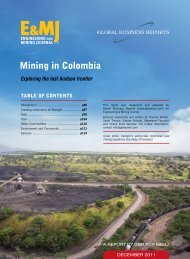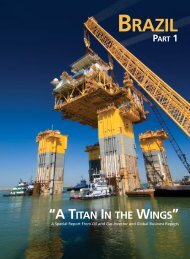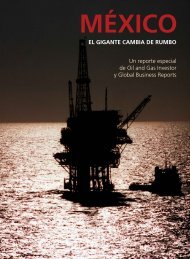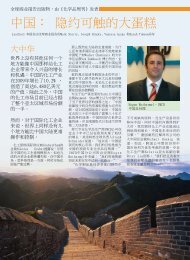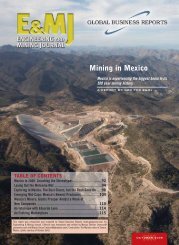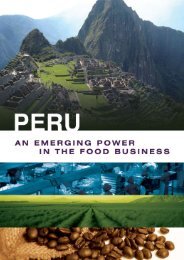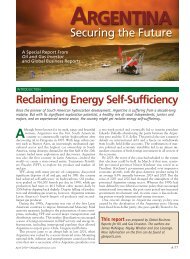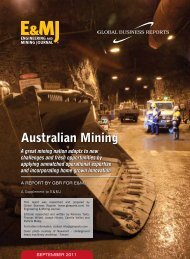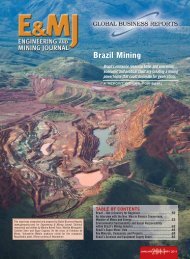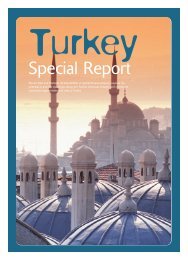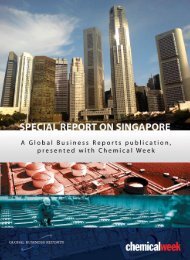Indonesia Mining 2012 - GBR
Indonesia Mining 2012 - GBR
Indonesia Mining 2012 - GBR
Create successful ePaper yourself
Turn your PDF publications into a flip-book with our unique Google optimized e-Paper software.
<strong>Mining</strong> IN <strong>Indonesia</strong><br />
In Defense of the 2009 <strong>Mining</strong> Law<br />
Interview with Dr. Simon Sembiring, former director general mineral, coal and<br />
geothermal, and chief architect of the 2009 mining law<br />
What are some of the benefits of<br />
the 2009 <strong>Mining</strong> Law?<br />
There are a number of benefits to the 2009<br />
<strong>Mining</strong> Law. Firstly, I would like to state<br />
that the IUP is a greatly misunderstood<br />
piece of legislation; it is actually much more<br />
efficient than its predecessor in setting out<br />
the requirements for any mining operation.<br />
It provides certainty where the CoW system<br />
did not. However, since its introduction in<br />
2009, subsequent implementing regulations<br />
have not provided sufficient levels of<br />
clarity for investors.<br />
Nevertheless, the 2009 <strong>Mining</strong> Law is<br />
a step in the right direction, and remains<br />
superior to the CoW system. For example,<br />
the previous <strong>Mining</strong> Law did not mention<br />
service companies at all; however, this new<br />
mining act prescribes specific provisions for<br />
their services. Furthermore, the new <strong>Mining</strong><br />
Law supports the development of an <strong>Indonesia</strong>n<br />
local mining services sector, ensuring<br />
that they get work as long as they can<br />
compete with their foreign counterparts,<br />
both financially and technically. The promulgation<br />
of this law supports free competition,<br />
while at the same time guaranteeing<br />
the growth and development of the local<br />
mining services industry.<br />
The 2009 <strong>Mining</strong> Law has also introduced<br />
a tender system for metal minerals<br />
and coal by which companies apply and<br />
compete to get the permit or license. This<br />
guarantees that the most qualified companies<br />
acquire the license. In the past companies<br />
would acquire licenses and fail to do any<br />
work on the land. Old regulations provided<br />
companies with too much freedom and allowed<br />
for unnecessary amounts of abuse.<br />
In short, the 2009 <strong>Mining</strong> Law is a<br />
great piece of legislation that is superior<br />
to its predecessor. Admittedly, subsequent<br />
implementation of regulations hashave not<br />
provided the required degrees of clarity, but<br />
in time, I believe that these issues will be<br />
resolved.<br />
Why was it necessary to get rid of<br />
the Contract of Work system when<br />
so many companies had a favorable<br />
view of it?<br />
Foreign companies prefer the CoW system<br />
because it put them in an unfair position, on<br />
an equal legal footing with the government.<br />
Wherever one goes in the world, the prevailing<br />
system for mining awards companies<br />
licenses, not contracts. When companies<br />
complain about the IUP system, they need<br />
to understand that contracts between companies<br />
and the government do not exist in<br />
other parts of the world. Companies do not<br />
have this privilege in Australia or the United<br />
States, so why do they expect to have it<br />
in <strong>Indonesia</strong>? Companies enjoyed the old<br />
system because they had to make minimal<br />
contributions to the <strong>Indonesia</strong>n society;<br />
now they are dissatisfied because they realize<br />
that the honeymoon period is over.<br />
The CoW system provided very little<br />
benefit to the people of <strong>Indonesia</strong>. How is<br />
it appropriate that a state-owned company<br />
like Aneka Tambang pay a 3.5% royalty for<br />
gold, while Freeport, a company that is literally<br />
printing money, only pays a 1% royalty?<br />
How is this fair, and, more importantly,<br />
how does it benefit the <strong>Indonesia</strong>n people?<br />
The value-added requirements contained<br />
in the new mining law have<br />
been a source of some controversy.<br />
How important are these to the future<br />
of the <strong>Indonesia</strong>n economy?<br />
Every journey, however long it may be, begins<br />
with a single step. The <strong>Indonesia</strong>n<br />
government’s move to require in-country,<br />
value-added processing was not a rash decision,<br />
but rather a very calculated one. For<br />
<strong>Indonesia</strong> to grow and develop as a country,<br />
we must stop exporting raw materials and<br />
must instead add value to the product, using<br />
local human capital and expertise. We<br />
must create the link between the upstream<br />
and downstream businesses here in <strong>Indonesia</strong>.<br />
I am certain that there will be challenges<br />
along the way, but I am certain that this requirement<br />
will have positive ramifications on<br />
our country’s long-term economic prospects.<br />
<strong>Indonesia</strong> must make the big jump forward<br />
in terms of development. We are not being<br />
unrealistic when we ask companies to build<br />
smelters and refineries in <strong>Indonesia</strong>. Posco,<br />
a new entrant in the <strong>Indonesia</strong>n market,<br />
is already in the process of constructing a<br />
smelter that should be in operation by 2013.<br />
They are setting an example for the rest of<br />
the foreign companies working in <strong>Indonesia</strong>.<br />
Why was the introduction of a new<br />
mining law necessary?<br />
In 1967, Suharto needed to create incentives<br />
to attract foreign companies to invest<br />
in <strong>Indonesia</strong>’s mineral resource industry.<br />
The nation’s economy was a shambles and<br />
inflation was out of control at 650%. However,<br />
the economic situation in <strong>Indonesia</strong><br />
is drastically different. Laws and economic<br />
policy should be dynamic and must be<br />
modified so that they are appropriate with<br />
the realities of our time. We still invite foreign<br />
companies to come work in <strong>Indonesia</strong>,<br />
but not at the expense of the <strong>Indonesia</strong>n<br />
people; the rules of the game must become<br />
more egalitarian. The 2009 <strong>Mining</strong> Law allows<br />
the <strong>Indonesia</strong>n people to reclaim their<br />
sovereignty.<br />
When compared to other jurisdiction<br />
around the globe, how would<br />
you assess <strong>Indonesia</strong>’s “mining<br />
friendliness”?<br />
Recently, the government of Australia imposed<br />
higher taxes on mining companies<br />
to protect its people and ensure that they<br />
experienced the benefits of the mining<br />
boom. Just like in the case of the Australian<br />
government, the government of this country<br />
must do the same to protect the rights<br />
of the <strong>Indonesia</strong>n people. Article 33 of the<br />
constitution explicitly states that the country’s<br />
natural resources belong to the citizens<br />
of this country, the <strong>Indonesia</strong>n people. In<br />
the future, the <strong>Indonesia</strong>n government will<br />
make sure that its citizens enjoy their country’s<br />
vast natural wealth. <strong>Indonesia</strong> is now<br />
a democracy; every citizen is entitled to the<br />
natural resource wealth of this country.<br />
Is <strong>Indonesia</strong> still an attractive destination<br />
for foreign companies?<br />
I have no doubt that <strong>Indonesia</strong> is still as<br />
attractive of a destination as it was in the<br />
past. The mining industry in <strong>Indonesia</strong> has<br />
been growing at a rate of 11% for the past<br />
three years; Indian, Chinese, and Australian<br />
mining companies are rushing to do<br />
business in this country, and while there<br />
are some companies that have decided to<br />
leave, their decision is a reflection of their<br />
company’s shortcomings, not of the regulatory<br />
challenges they face in the <strong>Indonesia</strong>.<br />
www.e-mj.com E&MJ • JULY <strong>2012</strong> 67



